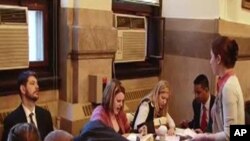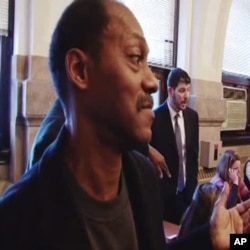When the U.S. economy fell into recession two years ago, millions of Americans began defaulting on their home mortgages, leaving many cities with neighborhoods of abandoned homes. But in the East coast city of Philadelphia, people on all sides of the problem got together in an attempt to find a way to keep people in their homes.
It's 9 A.M. in city courtroom 676 and already a crowd of people facing foreclosure have lined up for a chance to keep their homes.
George Gordon waits patiently for a chance to meet face to face with his mortgage company's attorney. "I originally got into trouble because I was working when I got the mortgage, but I lost my job. Once I lost my job, everything started to go downhill from there."
Two years ago, as Philadelphia faced a staggering number of home foreclosures, city officials, lender attorneys and homeowner advocates sat down to see what could be done.
They created Philadelphia's foreclosure prevention program. Judge Annette Rizzo took part in the negotiations. "And basically it is to take a brief freeze frame on individual cases to see if we can really break them down and have face to face communications between those representing consumers or homeowners with lender attorneys to see if deals can be struck," Rizzo said.
When home owners receive default notices from their mortgage companies, community advocates inform them of their rights.
Under the foreclosure prevention program, home owners have the right to meet with their lender to try to restructure their loan. Housing counselors like Mary Campbell are also is available to help guide homeowners through the process.
George Gordon is now working. The goal is to try to restructure his loan to keep his mortgage payments to within 31 percent of his income.
Lender attorney Christopher Denardo says given the number of mortgage defaults that banks face, restructuring the loans is advantageous for everyone involved. "If we are able to work something out with the borrower, were they get to keep their house, and my client gets to have payments according to the mortgage, that's a win for everybody," Denardo said.
Attorney fees, fees for property inspection and late fees are charged to the homeowner. But all or part can be waved during negotiations.
Homeowners are represented during the negotiations by volunteer attorneys.
Gordon applied for the program back in July. But he says his lender lost his paperwork. His attorney succeeds in getting a one month continuance.
Even though his case was not resolved today, Gordon is relieved.
"What we are going to do is redo his calculations under the make a home affordable plan, of 31 percent of his gross income and see whether that pans out," Campbell explained.
Philadelphia officials say the foreclosure prevention program has allowed more than 1900 homeowners to avoid foreclosure, and another 3600 are going through the process.











